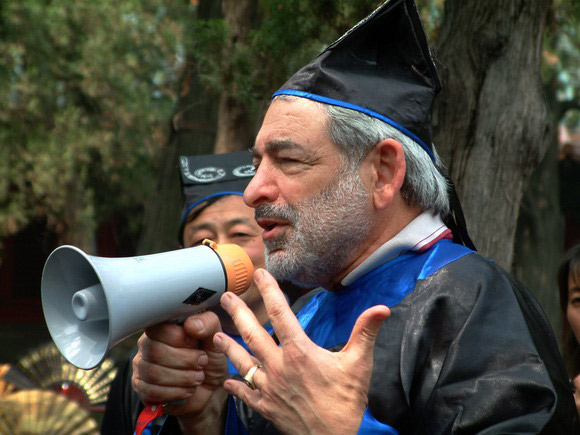Confucianism promotes Chinese culture to world

A foreigner tours the Temple of Confucius in Qufu, Shandong Province.
“Is it not delightful to have friends coming from distant quarters? Is he not a man of complete virtue, who feels no discomposure, though men may take no note of him?” recited a young American tourist to two admission employees in Qufu, Shandong Province, birthplace of Confucius.
After chanting five quotes of The Analects of Confucius, a collection of sayings and ideas attributed to the philosopher, he was allowed to tour the Temple of Confucius, the Cemetery of Confucius and the Kong Family Mansion for free.
Scholars have welcomed the move to give foreigners who can recite five famous quotes of Confucius free tours to his birthplace, saying it will promote the ancient philosopher’s wisdom and Chinese culture to the world. Since December 26, 2014, foreigners can receive free admission to the three Confucius-related United Nations Educational, Scientific and Cultural Organization (UNESCO) World Heritage Sites in Qufu, Shandong Province, if they can recite five sentences from The Analects.
According to an official at the Qufu Cultural Relics Administration, recent years have seen an upsurge in learning the traditional Chinese culture and rapid expansion of Confucius Institutes around the world. As the hometown of Confucius and birthplace of Confucianism, Qufu receives 150,000 foreign visitors annually.
The free-tour campaign aims exactly at enhancing foreign tourists’ interaction with Confucian culture, the official said.
Qufu introduced an identical policy for Chinese tourists in May 2013. Since then, 170,000 people have taken the challenge, about 65 percent of whom passed, making it one of the channels to carry forward and spread Confucian culture.
Scholars have noted that China is actively promoting its culture to go global and initiatively seeking dialogue with the rest of the world. In this undertaking, the broad and profound traditional Chinese culture plays a significant role.
During his inspection tour to the Kong Family Mansion in 2013, the Chinese President Xi Jinping showed strong interest in books and periodicals about Confucianism research conducted by the Chinese Confucius Research Institute (CCRI). In the subsequent discussion with relevant experts and scholars, he claimed that the longstanding traditional culture of the Chinese nation will create new splendor to Chinese culture on the whole.
Confucian culture is a symbol of the time-honored Chinese civilization and has exerted far-reaching influences on the nation. As an important component of traditional Chinese culture, it has an important bearing not only on the thinking pattern, creativity, traditions and customs as well as national character of the Chinese people, but also on world civilization.
CCRI director Yang Chaoming participated in the discussion with Xi. He noted that Confucianism is valuable in five ways.
First, Confucianism bears global significance. Confucius is a world-level philosopher comparable to Socrates and Plato. His ideas have contributed to basic human civilization. Only when the Confucius civilization goes global can Chinese culture go global.
Second, Confucianism is the bond connecting the entire Chinese civilization and the deepest ideological pursuit of the Chinese nation.
Third, Confucianism is the most fertile cultural soil for the localization of Marxism in China and socialism with Chinese characteristics.
Fourth, Confucian doctrines, such as exercising government by means of virtue and self-cultivation in reverential carefulness, have implications for today’s social governance and building of a clean Party and government.
Fifth, Confucianism is also helpful to improving self-cultivation and nurturing the thought pattern of teenagers.
For example, “what you do not want done to yourself, do not do to others” is a golden rule for interpersonal communication. In fact, the UN’s “Universal Declaration of Human Rights” and the “1993 Declaration towards a Global Ethics” have both absorbed the notion, which indicates that Confucianism can serve as a base for important modern philosophy, said Guo Qiyong, dean of the School of Chinese Classics at Wuhan University.
Wang Xulin, vice-president of Minzu University of China, said that the promotion of Chinese culture to the world must start from the cultural base. Meanwhile, cultural innovation must be carried out from global and long-term perspectives, Wang added.
“World-oriented innovation should pay attention to public feeling and put the emphasis on advancing global sustainable development,” Wang said, noting that this way it will be easier to engage in dialogue with other countries, and find research fields and topics for cultural innovation.
